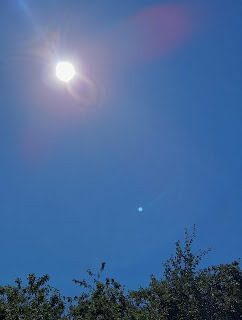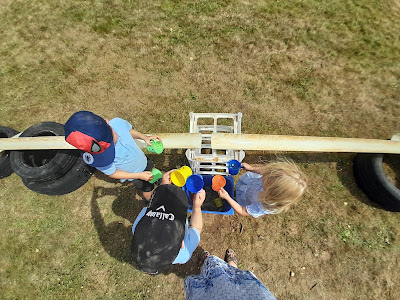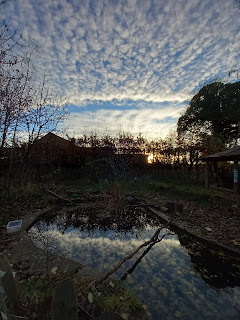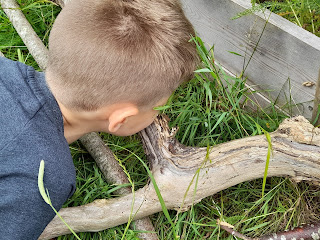That's it!
Forest School sessions ended this week.
Another academic year is over & out for us. The children and staff are still in for a few days, but now is our time for planning next year, catching up on admin, a few 'gardening' duties, maintenance, repair, and an opportunity to reflect on what we have achieved and how we plan to build on it.
As usual the last week of term was a Celebration Week to round off 6 weeks of sessions. Usually this requires a campfire, 400 marshmallows to toast, gallons of hot chocolate, half the biscuit aisle from the supermarket, and the delicate process of 'make your own' marshmallow sandwich task for all classes!
This time, it did not.
With the heat in South East England not only being high (for us!) and hotter predicted, we made the decision not to have campfires based on a number of factors:
- It is definitely hot enough! We do not to be warmed up any further. I wanted basecamp to be a shaded respite from the heat.
- Lack of rain recently has meant our field and meadow look akin to the golden crop next door on farmland! One stray spark could lead to disaster!
- Asthma has been triggered in staff and pupil these last few weeks. Some due to a circulating virus targeting throats but often reaching the chest, some due to very high pollen levels, and some due to the air quality. It's not overly polluted, but it is still and hot and uncomfortable.
- Is purely selfish - I do NOT want to be sat next to a campfire all week when it's recording at an average of 30oC in the shade!
Our Copse Site is set in the North corner of our field. We have left this corner as meadow and basecamp is hidden inside the circle of the Copse. The woodland strip is lovely and cool, any area where there is only grass is South facing, on a plateau, and bakes all day!
Temperatures were a minimum of 30 all week.
Children, I have found, either do not recognise or ignore the effects the heat has on them. Most understand the concept of 'sunburn', many have experienced some level of discomfort and seen the red marks it leaves.
Heat Stroke and Heat Exhaustion are something of an enigma to them! Especially the younger ones whose bodies don't necessarily regulate well to begin with!
When it comes to recognition of this possibility the responsibility relies heavily on others noticing the changes, managing the symptoms, and monitoring in case it shifts from Heat Exhaustion to Heat Stroke. As is in all things, prevention is better than cure, so I embraced my ability to repeat myself endlessly (welcome to education!) and issued constant annoying reminders to stay in the shade, drink more, slow down.
I even gave out a few mandatory 5 minutes cool-outs at basecamp to stay safe.
I also spoke to the children about the effects of the heat before they went to explore so they were more alert to what they may be feeling. This also lengthened the basecamp chat at the start of the session - which reduced their time potentially out in the sun.
For our celebrations this we swapped out hot chocolate for chocolate milk, toasting marsh mallows for mini ones to eat or float on your drink, then I had brought in ice poles/ice pops to end the session with. This way I knew the children had started the session with SOME hydration, and then replaced lost hydration at the end, and importantly, the ices provided cooling too! School staff were obviously on the ball and made sure the children brought their water bottles outside with them, and also brought back up for those who didn't have one.
Kent Fire Service has tackled 5 field/grass/hedgerow fires in the past 10 days, and has asked everyone to consider any kind of fire they start, with official advice including what should be common practice but so often isn't:
- avoid discarding cigarettes or matches while walking or driving through the countryside
- have barbecues in authorised areas and make sure it is cold before it is disposed of correctly
- be sure not leave barbecues or bonfires unattended
- avoid having campfires in the countryside
- use dirt or sand to put out bonfires when you leave
- litter such as reflective cans and glass can start fires, so take your rubbish with you
- if you live close to woodland or fields do not burn off garden rubbish during hot weather
Our school is surrounded on 3 sides by farmland. I love this Google Maps pic
because it is so green... currently it is all beige! Great for surrounding crops, not good for our scratchy stubble of a field, and great kindling for incident number six on the Kent Fire Service list if anything went wrong!
We have already noticed an increase in Asthma in the school, use of inhalers is up, air quality is heavy. I am already very aware of all the reasons we shouldn't have a fire (posted here), and yes I understand that my little campfire doesn't contribute much, but it's a bit like a plastic water bottle, do I decide that just one more won't make much of a difference, or do I aim to not use any? There are ways to mitigate risks (posted here) but in weather this hot things alter.
As someone who has spent quite a lot of time in hot countries I realise that 'Hot Weather' is a subjective term in many ways! The UK has very little infrastructure to deal with heat. Homes, schools, and businesses rarely have air conditioning. The way we capture and store water isn't geared for high demand. Frequently it arrives with humidity and/or a stillness that gives no ease. Respite from any heat is difficult to come by. Therefore classes arrive at basecamp already warmer than they should be and possibly dehydrated!
The children were able to give very good reasons without prompting as to why we shouldn't have a fire. And were not disappointed with chocolate milk before setting off to explore.
I set up activities that would entice them into the shade. The tools were undercover, books were available in a couple of shady spots, the mud kitchen was well supplied with water, and water chutes were cascading into the Dig Pit!
The week went from clear skies and unrelenting sun, to overcast and hotter, to a mix of sunshine and clouds with a cool breeze. And everyday the thermometer rose above 30oC in the sunshine. Next week is forecast to be even hotter!
The children loved the icy treats, and enjoyed Forest School as much as they always do. It was still a celebration of the end of term and the end of year.
Through a fluke of timetabling, Year 4 Parents got to briefly join in the fun on Thursday afternoon. The opportunity to show grown ups around their favourite parts of Forest School was something the children grabbed with gusto!
And then the last sessions of Forest School for this school year sizzled to an end...
Some Forest Schools are soldiering on through the heat, and I'm sure they have their own Risk Assessment, but this is the one I used (in case it is useful!)
Next year will be different, every year is different, but we are moving onward with our development, and upward with our provision!
Expect more exploring. Some new adventures. New training. New students. New pupils, New experiences. Lots of excitement!
We can't wait!











Comments
Post a Comment